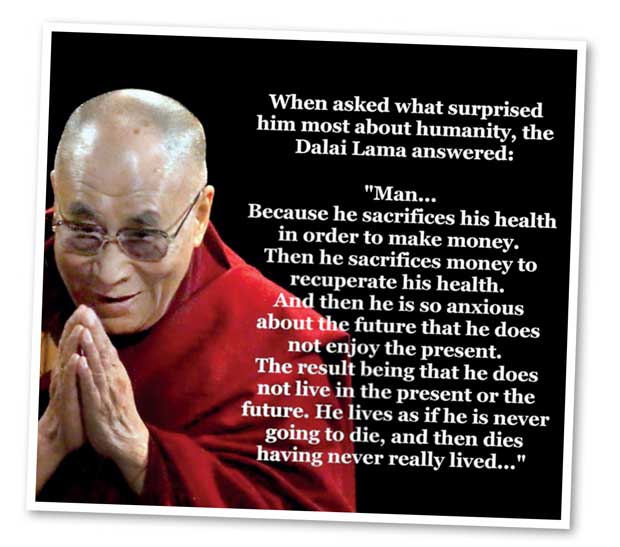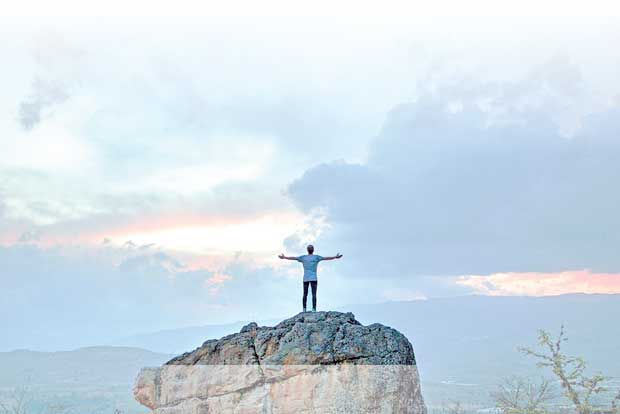Reply To:
Name - Reply Comment
Despite marked improvements in living standards, life expectancy and technology, the people of today seem to be more disillusioned and insecure than before. This includes the rich and the poor, the political elite and the powerless.
 There is a definite palpable and all-pervading feeling of helplessness. People feel they ‘miss life’ for the rat race. They yearn for something or someone to tell them how to live the life on ‘ideal terms’ so that they would feel secure and content. This feeling is shared by billions across the globe, from the United States to China and Iceland to the South Sandwich Islands.
There is a definite palpable and all-pervading feeling of helplessness. People feel they ‘miss life’ for the rat race. They yearn for something or someone to tell them how to live the life on ‘ideal terms’ so that they would feel secure and content. This feeling is shared by billions across the globe, from the United States to China and Iceland to the South Sandwich Islands.
Neither the capitalist U.S. nor the state-controlled capitalist China or Russia nor any other political system has been able to offer what the man wants most – a meaning to life.
I suppose the plight of man in today’s world is best summed up by the following quote attributed to The Dalai Lama. When asked by someone what amazes him the most about humanity, the spiritual leader replied, “Man. Because he sacrifices his health in order to make money. Then, he sacrifices money to recuperate his health. And then he is so anxious about the future that he does not enjoy the present; the result being that he does not live in the present or the future; he lives as if he is never going to die, and that he dies having never really lived.”

Time certainly flies. We grow old every second. Yet, are we really living our lives in a meaningful way? Is there a value for our life? Aren’t we just getting too busy with our daily chores that we hardly have time even to stop and think about the purpose of life? These are the questions one often asks.
“The meaning of life is to serve humanity,” said Leo Tolstoy. But, for many of those who are bogged down with day-to-day responsibilities, serving humanity looks like quite a tall order.
One feels that not everyone is driven to serve humanity, not unless one is as noble as Mother Theresa or Florence Nightingale. However, if this means helping each other in daily work or running an errand for an elderly neighbour, well that certainly is much less daunting.
After all, as Jean Jacques Rousseau said, “What wisdom can you find that is greater than kindness.” Kindness surely is the crowning glory of humanity. The human race would not have survived this far  if everyone were unashamedly selfish and did not look beyond one’s walls. The civilization has survived because of those who looked for solutions for its ills – health issues, moral degradation, political turmoil, natural catastrophes and many others.
if everyone were unashamedly selfish and did not look beyond one’s walls. The civilization has survived because of those who looked for solutions for its ills – health issues, moral degradation, political turmoil, natural catastrophes and many others.
While technology has helped man out of his many troubles, it has also kept him busy and distracted as never before.
“Life is really simple. But we insist on making it complicated,” said Confucius 2,500 years ago. The 25 centuries that followed had seen man making life more and more complicated that it is fast becoming almost unbearable. The simplicity is long lost.
“Living the moment,” according to Buddha, takes most of the burden out of the man’s shoulder. The Enlightened One insisted that one should neither mourn the past nor worry about the future. The modern science has proven beyond doubt that mindfulness (Sati in Pali) espoused by Buddha contributes to greater well-being of man, and mindfulness based treatment is being recommended for mental ailments as a therapeutic application.
“Accept the present moment as if you had invited it. It is all we ever have so we might as well work with it rather than struggling against it. We might as well make it our friend and teacher rather than our enemy,” says New York born Buddhist nun Ven. Pema Chodron. When living mindfully, we get space to gauge our intentions. The honesty of our intentions in everything we do is vital as the value of our life is totally dependent on our intentions.
Leading Washington based Buddhist nun Ven. Thubten Chodron (Cherry Greene) insists that a good ethical conduct with right motivations form the foundation for a meaningful life.
“When we keep good ethical conduct and are able to examine our motivations and let go of the corrupt ones and have kind motivations, we feel happier within ourselves and when we feel happier within ourselves, then our craving for external things decreases considerably,” Ven. Chodron observes in her writings.
Needless to say that a good ethical conduct also prevents us from falling into many pitfalls in life.
Ven. Chodron holds that people today are under the misconception that what they do to gain other’s appreciation decides the value of life.
“Having a good reputation, money, success, being famous, having love, praise, appreciation—these things get us absolutely nowhere in terms of our Dharma aims. We’re so habituated to, “Well, if I do something outside and outside appreciates it, then my life is worthwhile.” But the whole thing about karma is—the karmic value of an action isn’t how other people see it and respond to it. The karmic value is our own intention and that comes only from us,” Venerable Chodron points out. “So being famous, having money and prestige —that stuff doesn’t increase our good karma at all— is zero,” adds the Venerable Bhikkhuni. The problem with people, the Venerable Bhikkhuni says, is that they are being too hooked on to the external world and having a lot of attachment and craving for objects that seem to spark pleasant feelings.
She explains that what people are attached to, actually are the ‘pleasant feelings.’ Under the notion that the objects seem to bring pleasant feelings, they get attached to the object. “That has its disadvantages in the sense that then our happiness is always dependent on external people and things, which we cannot control. Whereas in our Dharma practice, what we’re trying to do is develop ourselves internally so that we’re happy with whatever is happening at the moment and aren’t so moved around by external people and external things. That gives us a lot more emotional stability,” she points out. “The best giving is the absence of possessiveness. When we clutch onto things, we want everything to be fixed and permanent. When we aren’t possessive, we’re more in tune with the reality of things arising due to causes and conditions and disappearing, changing into something else, due to causes and conditions. The more we can accept that flux, the more at ease our mind is, the less fear we have, and the more peaceful we are,” Ven. Chodron observes.